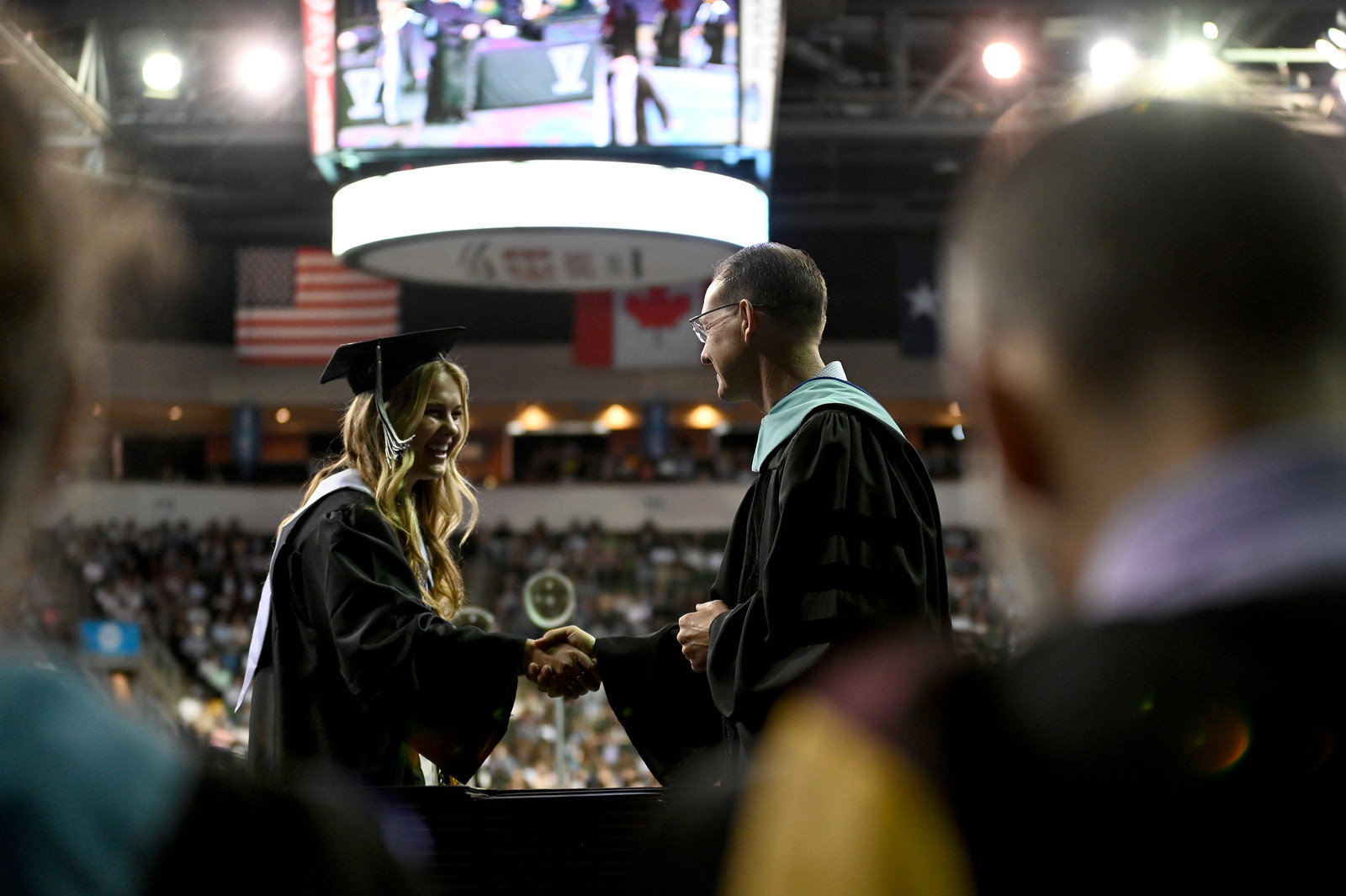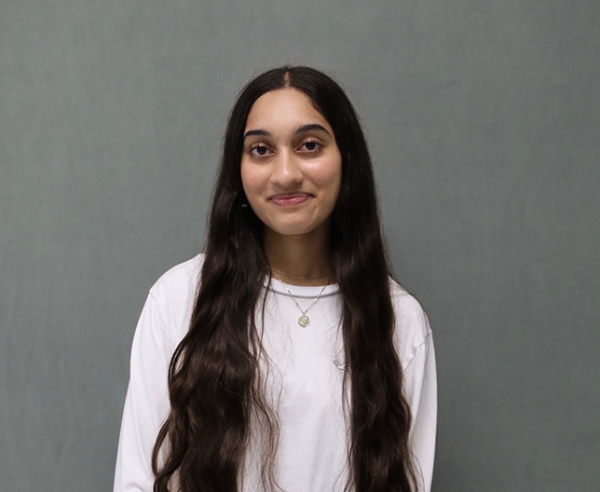Seniors Jeffery Gunawan, Anjali Gorti and Rachel Reynolds will approach the stage, gazing out into a sea of faces that they’ve grown up with and preparing to disseminate their wise words that reflect upon the last four years. Every assignment, quiz, exam, tutorial and extracurricular has led up to this moment. Their minds crowded with forever lasting memories and a cavernous feeling of nostalgia, they will then begin making the speeches that they’ve worked tremendously hard for.
Gunawan is the senior class valedictorian and sharing the same GPA, Gorti and Reynolds both hold the position of salutatorian. While these weeks before the graduation are packed with AP exams, finals and senior activities, their preparation and excitement for the graduation ceremony as well as the customary speeches is perspicuous.
“My favorite part of Vandegrift is how academically oriented a lot of it is as well as how connected the classes are,” Reynolds said. “I was sitting in APES and I’m like, ‘Oh, I learned some of this in bio,’ so it was cool to see that this biology concept I learned actually connects to this environmental stuff.”
Relearning material or learning it from a new angle tends to give students a fresh perspective of the concept, so seeing the overlap in several AP classes that Vandegrift offers has proven both interesting and helpful to students.
“It really helps that our school is so supportive of taking AP classes,” Reynolds said. “All the teachers are really great at making sure we’re prepared, so it made it easier to take the next step and pursue some harder classes. I used to go around to all my teachers and ask questions [before school] at 7:45, and they’re always super receptive to that.”
Reynolds as well as Gunawan and Gorti all took a heavy load of AP classes throughout their high school career, contributing significantly to their high GPAs. Since the valedictorian and two salutatorians also had a copious extracurricular schedule, they made an effort to devise the most effective time management plans. This included striving to finish homework in class, PITs and in the morning, rather than slacking off and succumbing to the urge of scrolling on your phone or socializing with others.
“If you do most of your stuff in class you’ll be able to get that balance,” Gunawan said. “With that balance, you’re able to not get burnt out, so I think that is what kept me going. The biggest challenge is just staying motivated, but if you have something to look forward to throughout the day, [you] can keep yourself going.”
Gunawan’s biggest motivator has been robotics. He participated in Vandegrift ViperBots until junior year, and he now commutes to a community robotics team based in Bee Cave, TX.
“I’ve spent all of my time at robotics,” Gunawan said. “For a lot of people, that might not seem like a balance, but for me, it was therapeutic. You’ll have those moments where you’re ripping your hair out because of it, but I thought of it as a hobby.”
Attending championships and ending in the third/fourth position in worlds this season has provided Gunawan with ample experience in this field and led him to to ascertain his passion for computer science, which he will be majoring in at University of Texas at Austin this fall.
“The robot room gave me a huge opportunity to get a head start in STEM,” Gunawan said. “I’ve learned a lot of hardware stuff like subtractive manufacturing, additive fabrication, 3D printing and milling, so I want to make my house super automated in the future with the skills I’ve built up.”
The salutatorians both plan to attend MIT in the fall, where Gorti intends to major in computer science and Reynolds intends to major in mechanical engineering. Similarly to the valedictorian, Reynolds has meticulously chosen her major partly according to the extracurriculars that she’s enjoyed throughout school.
“A lot of my hobbies are more STEM oriented, which is what a lot of my classes were,” Reynolds said. “I’m part of Destination Imagination and we were doing some project where I had to teach myself trust beam calculations. That was before I had taken physics, so by the time I got to physics, I already knew what free body diagrams were and how to balance those forces. It kind of helped that my interests aligned with what I was doing in school, and so they bounced off of each other in terms of what I was learning and doing while having fun.”
Reflecting on how she balanced her hobbies and academics, Reynolds recommends prioritization for students who are endeavoring to reach the top of their class.
“Prioritize your time and know what you’re already good at,” Reynolds said. “You don’t need to be stressing about a math test if you’re really good at math; go prioritize science. Trying to decide what you already know you can do well versus what you shouldn’t need to put work into, will help you figure out how to manage your time and be less stressed about doing well in general.”
While Gunawan also encourages students to get their work done in a timely manner, utilizing prioritization, he emphasizes the importance of GPA awareness.
“The number one thing is getting informed on how your GPA system works – what classes you should take, which ones are weighted and unweighted, and how your GPA actually gets calculated,” Gunawan said. “I’m a student aid for the College and Career Center, and I feel like the counselors do a really great job of explaining this.”
The GPA system was changed for the class of 2025 and below, to where only core classes as well as a language class apply to your GPA. In addition, AP classes are scaled at a 6.0 while advanced classes are scaled at a 5.5. Compared to the senior class GPA system in which all courses apply to your GPA and both advanced and AP classes are scaled at a 6.0, Gunawan believes this is a step in the right direction.
“Everytime I try to talk about the [GPA system], the people I’m talking to are like, ‘Well you’re the valedictorian, why do you care?’ But I should still be allowed to have an opinion. It’s very alienating for me – like I can never express my feelings.”
Regardless of their high grades, the students at the top of the class have too been affected by the GPA system, and both Gunawan and Reynolds have strong suggestions for change.
“I’d want less emphasis on just the stringent AP classes and more on the technical electives that build tools, skills and certifications,” Reynolds said. “I wish I took some more engineering classes to better prepare me for my future.”
Like Reynolds said, focusing on classes that correlate with your future major would be very beneficial for most. Gunawan proposes a potential idea of having colleges encourage students to declare a major or a specialization track. While many have their futures planned after middle school extracurriculars, Gunawan recognizes that it may be too early for most students to figure out exactly what they want to do by high school, so he suggests dabbling in multiple specializations at the same time. While this is just an idea, he encourages schools to support students in specifically what they want to pursue to keep them motivated.
“I played what everybody calls ‘the GPA game,’ so I took a bunch of weighted and AP classes that I might not have taken if I didn’t have to,” Gunawan said. “Kids should go to school because they want to learn a specific thing, not because they have to take a class that’ll benefit their college decision. I think changing the GPA system in some way where kids are able to learn what they’re passionate about would be much better.”



